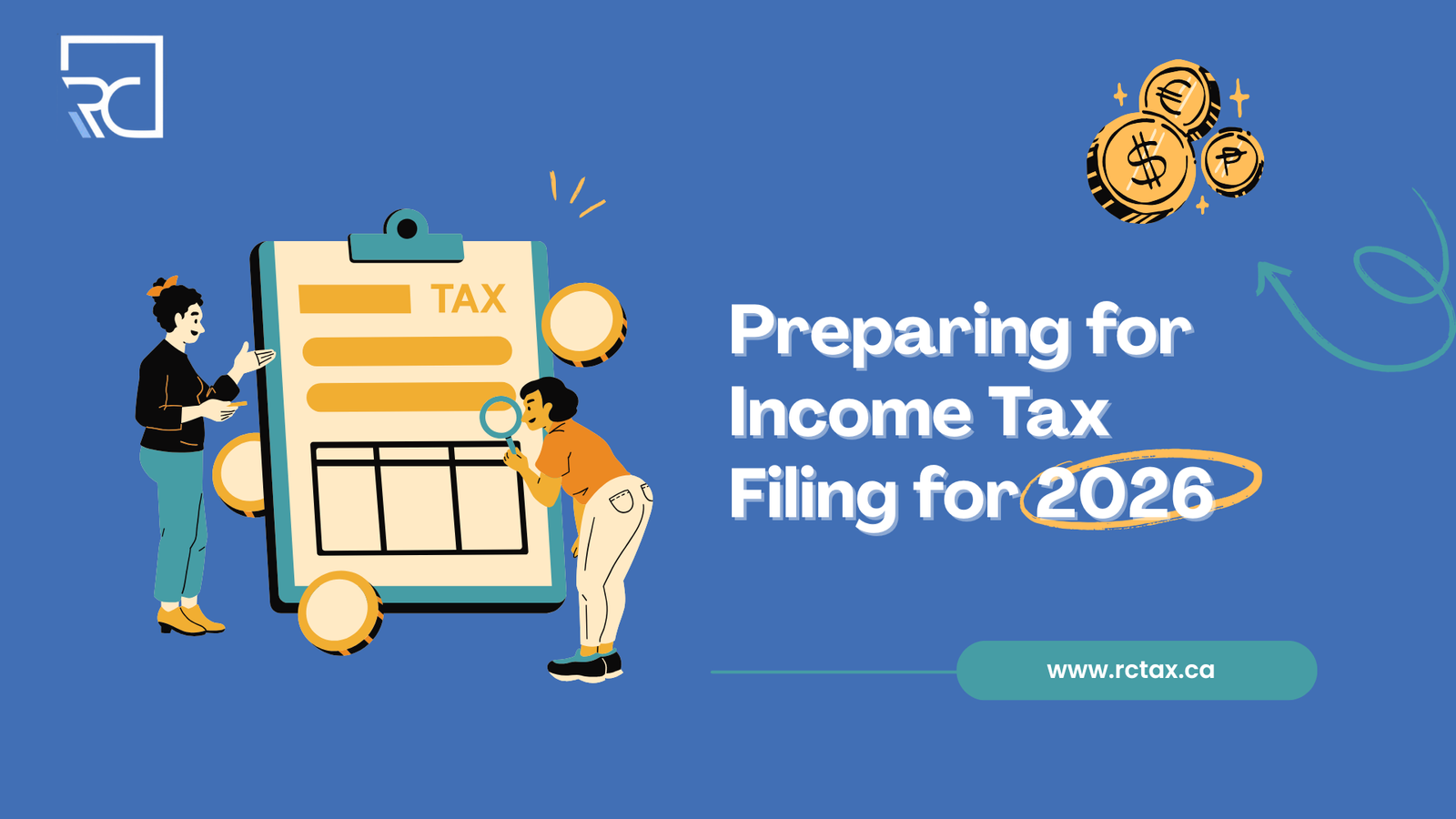The Small Business Owner’s Guide to Accurate Bookkeeping in Canada
For Canadian small business owners, accurate bookkeeping is more than record-keeping — it’s the backbone of compliance, tax savings, and smart decision-making. The Canada Revenue Agency (CRA) requires businesses to maintain detailed financial records, and neglecting this can lead to penalties, missed deductions, and unnecessary stress during tax returns filing.
At Ricky Chawla CPA Professional Corporation, we help entrepreneurs stay compliant while using accurate financial data to plan and grow their business. In this guide, you’ll learn why accurate bookkeeping matters, the key tasks every business owner should manage, common mistakes to avoid, and when to hire professional help.
Why Accurate Bookkeeping Matters
Accurate bookkeeping is essential for every Canadian small business because it impacts far more than just year-end tax preparation. When your records are precise and up to date, you:
Stay CRA Compliant: The Canada Revenue Agency expects clear, complete financial records. Proper bookkeeping in Canada ensures you can provide proof for every reported figure.
Make Smarter Decisions: Real-time financial data shows you which products, services, or clients are most profitable, and where costs can be reduced.
Maintain Healthy Cash Flow: Tracking accounts receivable and payable helps you avoid late payments, overdrafts, or cash shortages.
Prepare for Audits & Financing: Lenders, investors, and auditors require accurate statements before approving loans or investments.
Many small business owners only realize the value of bookkeeping when faced with an audit or a missed deduction. By treating it as an ongoing priority rather than a once-a-year task, you not only meet compliance requirements but also gain a reliable tool for running your business more efficiently.
Key Bookkeeping Responsibilities for Small Business Owners
Whether you handle your books personally or work with a professional, every Canadian small business owner should understand the core tasks involved in accurate bookkeeping:
Record Every Transaction: Log all income and expenses promptly to avoid missing entries or mixing them up later.
Track Accounts Payable & Receivable: Know exactly who owes you money and who you owe to keep cash flow steady.
Reconcile Bank Statements: Regularly match your accounting records with bank statements to catch errors or unauthorized transactions early.
Organize Receipts & Invoices: Keep clear, dated proof of every business expense. CRA accepts both digital and paper records, provided they are complete and legible.
Monitor GST/HST Obligations: If you’re registered for GST/HST, ensure you’re accurately recording amounts collected and remitted.
These responsibilities form the foundation of bookkeeping compliance in Canada. Neglecting even one can cause reporting errors, missed deductions, or issues during tax returns filing.
Common Bookkeeping Mistakes to Avoid
Even well-intentioned small business owners can make bookkeeping errors that cost money or create CRA issues. Some of the most common include:
Mixing Personal and Business Finances: Using the same bank account for personal and business expenses makes tracking and proving deductions far more difficult.
Delaying Data Entry: Waiting weeks or months to record transactions increases the risk of forgetting details or losing receipts.
Losing Expense Records: Without proper documentation, you can’t claim a deduction — no matter how legitimate the cost.
Ignoring GST/HST Requirements: Failing to register, collect, or remit GST/HST when required can lead to significant fines and interest.
Overlooking Bank Reconciliation: Skipping reconciliations means errors or fraudulent charges could go unnoticed.
Avoiding these mistakes not only keeps you compliant but also ensures you’re getting the full tax benefits your business is entitled to during tax returns filing.
Understanding Bookkeeping Compliance in Canada
The Canada Revenue Agency (CRA) sets clear rules for how businesses must maintain and store their financial records. Meeting these requirements is critical to staying penalty-free and audit-ready.
Key bookkeeping compliance points include:
Retention Period: Keep all supporting documents — including receipts, invoices, bank statements, and payroll records — for at least six years from the end of the last tax year they relate to.
Acceptable Formats: Both paper and digital records are valid, as long as they are complete, readable, and accessible if the CRA requests them.
GST/HST Reporting: If you exceed the small supplier threshold, you must register for GST/HST, charge it where applicable, and remit it according to your assigned filing frequency.
Payroll Records: If you have employees, maintain detailed payroll logs, deductions, and issued T4 slips for compliance with employment and tax laws.
Following these requirements not only ensures you meet CRA standards but also makes tax returns filing faster and more accurate.
Choosing the Right Bookkeeping System
The right bookkeeping system can save you hours of work, reduce errors, and keep your records CRA-compliant. Your choice should depend on your business size, transaction volume, and comfort with technology.
Common options include:
Manual Records: Writing transactions in ledgers or spreadsheets may work for very small businesses, but it’s time-consuming and prone to mistakes.
Desktop Software: Programs like Sage or QuickBooks Desktop offer robust features but require manual backups and installation on a specific computer.
Cloud-Based Software: Platforms such as QuickBooks Online, Xero, and Wave allow secure access from anywhere, automate bank feeds, and make it easy to collaborate with your CPA.
Cloud-based tools also store data securely and integrate with receipt management apps, making year-end reporting and tax returns filing much smoother.
How Accurate Bookkeeping Helps with Tax Returns Filing
When your books are up to date and error-free, tax returns filing becomes faster, easier, and far less stressful. Accurate bookkeeping offers several key benefits at tax time:
Maximizes Deductions: Every eligible expense is properly documented, ensuring you claim the full tax benefits available to your business.
Reduces Errors: Clear, organized records lower the risk of mistakes that could trigger CRA reassessments or audits.
Speeds Up Year-End Processing: Your CPA can prepare financial statements and file returns more quickly when all records are complete.
Improves Tax Planning: With accurate data, you and your accountant can identify ways to defer income, accelerate deductions, or optimize GST/HST filings before year-end.
In short, consistent and accurate bookkeeping is your best defense against compliance issues — and your best strategy for saving money when filing your taxes in Canada.
When to Hire a Professional Bookkeeper or CPA
While many small business owners start out managing their own books, there comes a point when outsourcing to a professional bookkeeper or CPA becomes the smarter choice. You should consider hiring help if:
You’re spending more time on bookkeeping than running your business.
Your GST/HST returns are often late or inaccurate.
You’ve received CRA notices, penalties, or audit requests.
You’re unsure about expense eligibility or payroll compliance.
Your records are incomplete or disorganized at year-end.
A professional can ensure accuracy, maintain CRA compliance, and offer strategic advice to improve cash flow and reduce your real estate tax or business tax obligations. At Ricky Chawla CPA Professional Corporation, we provide tailored bookkeeping services that save time, reduce stress, and maximize financial efficiency.
Accurate bookkeeping is not just about staying compliant — it’s about giving your business the financial clarity it needs to grow. By recording every transaction, avoiding common mistakes, meeting CRA requirements, and choosing the right bookkeeping system, you set your business up for long-term success.
If you’re ready to take the stress out of bookkeeping and ensure your records are accurate, compliant, and tax-ready, contact Ricky Chawla CPA Professional Corporation today. Let us help you build a bookkeeping process that works for your business — so you can focus on what you do best.






